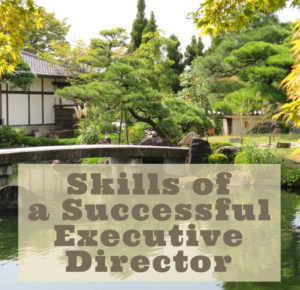 Becoming a strong executive director takes a wide range of skills. No one can be strong in every single area, of course, but you do need to have the basics down in each and know where you can improve. The skills listed below are all ones you can learn with practice.
Becoming a strong executive director takes a wide range of skills. No one can be strong in every single area, of course, but you do need to have the basics down in each and know where you can improve. The skills listed below are all ones you can learn with practice.
When I first became an ED, I had a variety of skills from my previous nonprofit position, but there was a lot to learn. The biggest areas of growth for me were financial management, fundraising, and HR, as I came from an organization with whole teams for those tasks. Other skills I had already. I was passionate about the cause, and cared about helping others. I had written and managed grants of all kinds. I had managed staff, and programs. Especially in those first few years, I spent my time learning the areas that I wasn’t as strong in.
Below are a few of the broader skills to consider developing if you are interested in an ED role. The good news is that they are applicable across all sectors. All my ED knowledge was quite valuable in my later roles as an interim ED in very different types of nonprofits.
Seeing the financial big picture
It’s essential to have an overarching view of the finances of your organization. This includes knowing where funds come from, the likelihood of them continuing, and what your major expenses are. It also means being able to explain these numbers to your board and staff so they understand the finances. It includes having a good understanding of the financial health of each program you offer. Develop this skill by diving deep into your finances and learning the details so you can extrapolate out to the bigger picture. If you aren’t an ED, do the same with your current organization’s finances or your program.
Getting the message across
Being a fantastic communicator is essential for any ED. You need to be comfortable in writing short messages, genuine thank you notes, one-on-one with donors, and speaking to large groups. That’s quite a range of skills, but as someone who is passionate about their mission, it won’t be hard to cultivate them. Start now by asking others for feedback on your communication and really listening to what they say. Challenge yourself to find new ways to communicate in your current role or volunteer positions.
Asking for money
Every ED needs to be an excellent fundraiser. Even if the organization has development staff, the ED has a critical role to play in fundraising, as they need to build a network of supporters and be the one to make the asks to major donors. The ED has a key role in helping the board fundraise as well and needs to set a good example. This will always be a key focus of hiring committees, so be ready to talk about your experience fundraising. If you haven’t done it, talk about all the parts of fundraising that you have done. It’s an easy area to get experience in, just find a small nonprofit you care about and offer to help them raise money. They’ll love the help.
Be forthright and persistent
As an ED, you have to be prepared for challenges, and for the fact that not everyone will agree that your cause is important. (If they did, it would be solved already.) You need to be courageous and step forward when others are stepping back. You need to be comfortable embracing conflict when someone doesn’t agree with you. It’s not easy, but the strength of your mission will help you do it. If this is an area you need to work on, find small ways you can step up and be a little more courageous every day. It adds up.
Emotional intelligence
Emotional intelligence is a buzz word these days, but it simply means that you understand your own emotions and are able to manage them. It also means that you pay attention to others’ emotions and have empathy for them. It’s a skill we all are constantly improving, but it is especially critical for an ED to be sensitive to others to gain their trust.
Governance and management
An executive director’s job is all about working with people, both the board and the staff. An ED must understand how boards can function most effectively and how the ED can make that happen. They also need to be able to manage people well and especially be good at delegating tasks. Too many EDs burn out because they don’t let go of tasks. You can’t do it all – other people might even do it better than you and you can focus on other work.
Strategic planning and thinking
Being visionary is often mentioned as a key ED skill, and it is definitely important. The ED needs to be able to see the cohesive vision for how the organization is making a difference in the world, and have a strong vision for future opportunities. However, I have seen EDs who are too visionary and don’t understand the details of how their organization works. Unless you have a strong COO running the organization, the ED needs to also understand the day-to-day operations. Visionary ideas are great, but they can only be carried out when there’s a strong plan with detailed steps to make them happen.
What skills would you add to this list? Add them in the comments. Feel free to reach out if I can help you on the path toward improving your skills.
